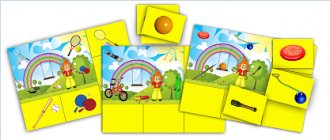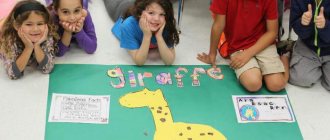Conversation in the senior group on the topic “Polite words”
Lyudmila Pushkina
Conversation in the senior group on the topic “Polite words”
Conversation in the senior group on the topic : “ Polite words ”
Conducted in MADOU D/S9 group No. 3 “Ivushka”
Integration of educational areas: “Communication”
,
“Reading fiction”
,
“Socialization”
Purpose: To systematize and consolidate children’s knowledge of moral education.
Educational: To form an idea of an educated person.
Developmental: Develop attention, memory, logical thinking, observation, coherent speech.
Educational: Cultivate a desire politely with people.
Demonstration material: Toy Parsley, ball.
Methodological techniques: conversation - dialogue , reading a poem, game situation, physical education, summing up.
Summary of an ethical conversation in the preparatory group “Polite words and actions”
Summary of ethical conversation in the preparatory group
"Polite words and actions"
Integration of educational areas:
“Cognitive development”, “Social and communicative”, “Speech development”, “Physical development”
“Speech development”:
— Learn to emotionally and actively participate in dialogues
— Develop skills in using polite words and expressions in speech, teach children the correct construction of sentences
“Social and communicative development”:
— Cultivate moral qualities: politeness, respect for elders
— To develop the ability to reasonably evaluate one’s actions and the actions of other people
«Cognitive development":
— To consolidate children’s knowledge about politeness, about polite people, knowledge of proverbs and sayings about politeness
"Physical development""
— Promote the development of children’s motor activity: coordination of movements, coordination of actions, dexterity
Preliminary work:
creation of special situations requiring polite treatment. Stories from a teacher from his childhood “How I learned politeness as a little girl.” Observing the relationships between children in games, everyday life, reading works with an aesthetic basis.
Progress of the lesson:
1 part
Host: Guys, think and tell me, who can we call a polite person? (children's answers)
Host: That's right, a polite person does not cause trouble or offense to another. A polite person always says hello and goodbye, is friendly and attentive. If they ask him about something or ask him to provide some kind of service (bring something, help, etc.), he always does it willingly.
Guys, imagine that you live in a world where no one ever says: “sorry”, “excuse me”, “Please”. What do you think would happen? Why do we need such words? (children's answers)
Now tell me what polite words you know? (children's answers).
Host: If someone does something for you, you should say “thank you.” If someone says “thank you” to you, then you should say “you’re welcome”. And if you accidentally pushed someone, you should say “please excuse me.”
part 2
Host: To make sure you really understand everything, let's play a game. The game is that you will chorus to insert polite words into my story.
“One day Vova went to the theater. On the tram, he sat near the window and looked at the streets with interest, suddenly a woman with a little boy entered the tram, Vova stood up and said to the woman: “sit down” (the children chorused “please”). The woman politely thanked the boy Vova (the children said “thank you” in chorus). Suddenly the tram stopped, Vova immediately fell and pushed a man hard. The man got angry with the boy, and Vova immediately said (the children chorused “please excuse me”).
Well done! Did a good job.
Part 3.
Host: Guys, have any of you ever interfered in other people's conversations? Were they upset? Were they happy? (children's answers)
Host: When can you intervene in the conversation?
Children: Only if it is important and urgent.
Host: When should you not interrupt a conversation, no matter how important it is for you to resolve some issue?
Children: When people don't want to be interrupted or when they are very upset.
Host: Who guys will tell us how you can politely intervene in a conversation between two children or adults?
Children: Stand so that they can see you, wait for an answer. If the answer is no, accept it and leave. If the answer is yes, say thank you and quickly state the reason why you are intervening in the conversation.
Host: Now let's practice (play out cases, prepare children in advance).
Part 4
Host: Close your eyes and imagine a world where everyone shares with each other. There are no hungry or homeless people, everyone has housing. Imagine a world where no one jostles, tries to grab something or jumps in line. Where all people are kind to each other and polite.
Open your eyes, how did you like the world you just visited? What do you think? Would you like to live in such a world? (children's answers)
Host: And it is quite possible to have a world similar to this one. When we all learn to live well, in peace, to be kind, polite, to help each other, all this will be possible.
Now let's have a little fun and try to do what we talked about.
Part 5
Host: Let's play the game "Musical Knees." (Children stand in a circle, holding onto the waist of the person in front. When the music starts, they begin to move in a circle. When the music stops, each child must sit on their knees and not fall.) 2-3 times
Presenter: Well done! No one let anyone down, no one fell. Now let’s learn how to compliment each other. It’s very nice when someone says nice things about you, you want to become even better and kinder so that no one is offended. I wrote your names on pieces of paper, whose name you draw out and we will say compliments: “You have beautiful hair!”, “You have a beautiful dress!”, “Olya is very kind, she treats me with sweets,” etc.
Part 6
Host: And we completed this task. Egor Sasha, Masha and Christina said a lot of good and kind words about the children.
Well, now you and I will all become journalists and learn how to interview our comrades. An interview is when questions are asked, and someone answers them (pulls out a piece of paper with the name again). The child comes out, and the others ask questions. You can ask your friend: “What do you like to eat?” What's your favorite toy? What games do you like to play? Do you help your mother at home? At the same time, do not forget to say “tell me please” (children’s questions).
Presenter: Well done children! In the next lesson, we will also learn how to compliment each other and conduct interviews.
Result:
What did we talk about today? (children's answers).
Summary of a lesson on speech development for the senior group “Polite words”
Elena Vradiy
Summary of a lesson on speech development for the senior group “Polite words”
Summary of a lesson on speech development in the senior group
"Learning to be polite "
Goals and objectives: tell children about some important rules of behavior in a team, the need to comply with them; to form in children the habit of following generally accepted rules of politeness , to teach children a culture of communication, to activate the appropriate words and phrases speech .
Ethical conversation on the topic: “Polite words”
Ethical conversation on the topic: “Polite words”
If we are polite Every day and hour - The world will become happier Millions of times!
Goal: developing moral and ethical standards in children, instilling a desire to be polite.
Conversation.
1. What is politeness.
Politeness is one of the most important qualities of a well-mannered person. Until the 16th century, the word “vezha” meant “expert” - one who knows the rules of decency, the forms of expressing a good attitude towards people. The rules of politeness are familiar to all of us. They are not difficult, and every person can and should do them. What do you guys think, what is politeness?
2. Politeness is a very important quality for every person. In order to show politeness, there are special polite words. Sometimes such words are even called magical, because every word contains great power, they can perform miracles! What do you think are polite words?
3. Let's look at the board and read the poem:
Words: “Goodbye!”, “Thank you”, “Sorry”, “Please”, “Hello” - Give generously! Give to passers-by, friends and acquaintances. On a trolleybus, in a park.
At school and at home. These words are very, very important. A person needs them like air. It is impossible to live in the world without them. These words must be given with a smile.
What polite words did you come across in the poem? What other polite words do you know?
4. Saying polite words is very important and correct, but at the same time, you need to know why and in what situation this or that word is used.
Now we need to complete the next task. Take a look at the board again. Here are some polite words (good morning, hello, please, thank you). You need to reason and say what these words mean and when, in what situation we can use them.
5. Do you guys think it is important to use polite words when communicating? Why do you think so? Do you often use polite words?
6. Now let's check how many polite words you know. I will throw the ball to one of you, and whoever has it in his hands will have to say one polite word. Words should not be repeated.
Guys, I made sure that you know a lot of kind, polite words. Give them more often to your loved ones, family, and friends!
6. — Let’s summarize our conversation. What new things have you learned? Why do we need to know polite words? What kind of person do you consider polite?
Guys, in the everyday life of a polite, well-mannered person there should always be words that we call “magic”. With these words you can open any doors and help restore a good mood. Do good, learn to do good deeds! And at the end of our conversation, listen to V. Soloukhin’s poem “Hello!”:




